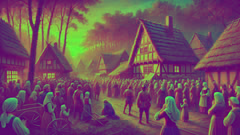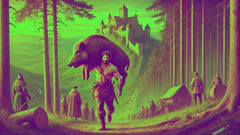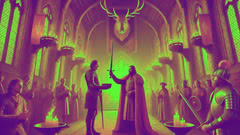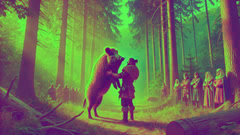Introduction
Long ago, when the forests of Bohemia stretched wild and thick across the land and the mighty Vltava River cut a silver path through emerald hills, a legend took root—one whispered by the wind in the groves, sung by the hearths of humble cottages, and carved in the memory of an entire people. It was the time before the city of Prague blossomed into a jewel of Europe, before stone bridges and spires claimed the skyline, when Vysehrad, the castle on the heights, watched over the countryside like a silent sentinel. In these days, the people who lived along the river’s banks were deeply entwined with nature, honoring ancient customs and drawing their strength from the same earth that bore the dense woods and the wild beasts within them. They worked the soil, fished the waters, and revered the cycle of seasons, but beneath the calm rhythm of their lives, danger often lurked just beyond the treeline. The forests were home to creatures both wondrous and fearsome, but none struck more terror into the hearts of the villagers than the monstrous wild boar—a beast of such size and fury that it seemed touched by some ancient spirit of chaos. It ravaged fields, overturned carts, and sent even the bravest hunters fleeing into the night. Yet out of this darkness, a figure emerged whose name would echo through centuries: Bivoj. Known for his immense strength and indomitable spirit, Bivoj was a man of the people, as rooted in the earth as the old oaks themselves. His hands were broad and calloused, his laughter loud and honest, and his heart quick to defend those in need. Unlike kings or noble knights, Bivoj bore no title but that which his deeds would earn him. His legend began not with birthright, but with an act of courage so astonishing that it would capture the imagination of all Bohemia. It is this tale—the legend of Bivoj and the wild boar of Vysehrad—that has endured, not only as a story of impossible strength but as a testament to the courage that can rise from even the humblest among us.
The Wild Boar's Reign of Terror
In the heart of the Bohemian countryside, where villages huddled close to the edge of the forest for both shelter and sustenance, the balance between man and nature was always delicate. Life was guided by the sun’s rising and setting, by harvest and hunt, by joy and mourning, all woven together under the watchful eyes of the gods and the ancestors whose spirits lingered in the stones and trees. It was a place where stories traveled faster than the wind, and fear could spread like fire through dry grass. The year the wild boar arrived was one etched in collective memory. It came from the deep woods west of Vysehrad, an enormous beast with bristling black hair, shoulders as high as a man’s chest, and eyes that seemed to burn with ancient anger. The villagers named it Knour—the Boar—and it soon became clear that this was no ordinary animal. Fields that lay near the forest’s edge were trampled overnight, young saplings uprooted, and fences smashed as if they were no more than twigs. Goatherds who ventured out in the early mist returned with stories of seeing the monster’s tusks flash in the morning sun, and sometimes, they didn’t return at all. Rumor held that Knour had survived countless hunts, carrying the scars of arrows and spears upon its thick hide. Some whispered that it was protected by a forest spirit, a beast sent to punish the people for trespassing too deep into sacred groves. Others believed it was simply the largest and cleverest boar to ever roam Bohemia, grown cunning from years of evading men. The lord of Vysehrad, knyaz Svatopluk, sent his bravest hunters into the woods, armed with spears and accompanied by barking hounds. They returned battered and empty-handed, their faces pale with stories of how the boar charged through undergrowth like a rolling boulder, scattering dogs and men alike. The beast had outwitted every trap, survived every arrow, and left behind only devastation and fear. As spring turned to summer, desperation set in. Crops failed where the boar rampaged, and the villagers began leaving offerings at the forest’s edge—bowls of grain, trinkets, even bread and salt—in hope of appeasing whatever spirit might guide the beast. Children were kept indoors after sunset, and the once lively evenings grew silent, as if the land itself was holding its breath. Then word spread of Bivoj—a man whose feats of strength were already the stuff of tavern tales. He had split oak logs in a single swing, hauled stones so heavy that three oxen would balk, and once wrestled a bear that threatened a shepherd’s flock. But Bivoj was not just strong; he was brave and wise, with a deep respect for the world around him. When he heard of Knour’s terror, he did not boast or make empty promises. Instead, he listened to the stories, walked the fields to see the damage for himself, and spoke to those whose lives had been upended. He saw fear in their eyes, but also a spark of hope—hope that perhaps someone could free them from the beast’s shadow. Bivoj agreed to try, not for gold or glory, but because he could not stand by while his people suffered. He prepared in silence, sharpening his old hunting knife and oiling the leather straps of his boots. He spoke a quiet prayer to Perun, god of thunder, asking for strength not just of body but of spirit. At dawn, as mist still clung to the earth and birds began their morning chorus, Bivoj set off into the deep woods—alone. The villagers watched him go, their hearts heavy with both dread and anticipation. They knew that if Bivoj failed, there would be little left to protect them. The forest swallowed him in its green embrace, and soon all that remained was the hope that courage and strength could still make a difference, even against the wildest of odds.

Bivoj’s Test: The Hunt in the Heart of the Forest
The air within the forest was heavy with anticipation. Shadows stretched long across the mossy ground as Bivoj pressed deeper into the woodland’s ancient heart, guided by animal tracks and the subtle signs only a seasoned hunter could read. He moved with purpose but not haste, each step deliberate. The deeper he went, the more it felt as if the trees themselves were watching—old oaks and twisted beeches crowding close, their roots like fingers gripping the earth. The forest seemed almost silent, except for the occasional caw of a distant crow or the whisper of wind through leaves. Bivoj paused often, crouching to examine broken twigs or a patch of trampled grass. He noticed the marks left by Knour: deep gouges in tree bark, clumps of black bristle caught on thorn bushes, and fresh churned earth where the beast had rooted for food. The signs grew fresher as he pressed on. At a small clearing where sunlight pooled like liquid gold, Bivoj knelt and touched the ground. It was still warm from the boar’s passage. His heart pounded—not with fear, but with a fierce resolve. He drew his knife, notched his belt tighter, and waited. Hours passed. A doe crept through the underbrush and drank from a shallow brook. Squirrels chattered above, and once, a fox paused to sniff at Bivoj’s boot before darting away. He remained as still as stone, listening. Then he heard it—a low grunt, followed by the rhythmic crunch of heavy footsteps. Out of the thicket burst Knour, snout caked with mud, eyes gleaming like embers. The boar paused, nostrils flaring, sensing an intruder. Bivoj rose slowly, meeting its gaze. For a moment, man and beast regarded each other, two forces of nature locked in silent challenge. The boar charged. Its hooves thundered against the earth, tusks tearing through ferns and saplings. Bivoj braced himself, sidestepping at the last instant and grabbing hold of the beast’s left ear. Knour bellowed in rage, twisting with a power that would have flung any lesser man aside. But Bivoj’s grip held. With his other hand, he seized the right ear, planting his feet wide apart and anchoring himself like an oak. The struggle was titanic—man and beast locked in a desperate dance. The boar thrashed and heaved, trying to gore Bivoj with its tusks or crush him against the trees. Bivoj’s muscles burned as he strained to keep his hold, sweat pouring down his face. Each time the beast twisted, Bivoj shifted his weight, moving with an instinct honed by years of hard labor and wilderness living. He spoke softly to the boar, not to taunt it but to calm it, his voice a low rumble that seemed to reach some primal place in the animal’s heart. Gradually, Knour’s fury ebbed, replaced by exhaustion. Its struggles weakened until finally, with one last gasp, it stood trembling but subdued. Bivoj waited until he was sure the beast would not charge again. Then, in an act that would become legendary, he stooped, slid his arms under the boar’s massive belly, and lifted. Every muscle in his body strained; his breath came in ragged gasps, but Bivoj did not falter. Inch by inch, he hoisted Knour onto his broad shoulders. The weight was immense—enough to crush a lesser man—but Bivoj steadied himself and began the long journey back through the forest. Step by step, he retraced his path, branches scraping his arms and sweat stinging his eyes. The boar hung limp but alive, its breath coming in slow huffs. Birds followed overhead, startled by this strange procession. By the time Bivoj neared the village, word had already spread. Children ran ahead to announce his return; elders hobbled to the forest’s edge, eyes wide in disbelief. When Bivoj emerged from the trees, burdened by the massive beast yet walking tall and proud, a cry of amazement rippled through the crowd. He set the boar down gently at the feet of knyaz Svatopluk, who stared at the sight as if witnessing a miracle. In that moment, the fear that had haunted the land was broken—not only by Bivoj’s strength, but by his willingness to face the impossible for the sake of his people.

The Reward and Bivoj’s Lasting Legacy
News of Bivoj’s feat swept through the countryside like wildfire. At Vysehrad Castle, noblemen and courtiers gathered in astonishment as word reached them—a single man had subdued and carried the monstrous boar back alive. Knyaz Svatopluk, a ruler known for both wisdom and pride, commanded that Bivoj be brought before him without delay. As Bivoj stood in the great hall, sweat-streaked and mud-spattered but unbowed, the assembled court fell silent. The boar, subdued yet very much alive, snorted and pawed at the floor, its massive bulk a living testament to Bivoj’s strength. Svatopluk descended from his dais, his embroidered cloak sweeping behind him. He circled Bivoj and the boar, eyes flickering between disbelief and admiration. "Never have I seen such a deed," he declared, his voice echoing off the stone walls. "You have rid our lands of terror and brought peace to our people. Name your reward." But Bivoj, ever humble, bowed his head. "My lord, I ask no gold or land. Let the people have back their peace and their fields, and I will be content." Svatopluk smiled at this and insisted that Bivoj accept some token of gratitude. After much persuasion, Bivoj agreed to accept only a finely crafted sword—one forged by the castle’s best smiths and blessed by the priestess Kazi herself, a wise woman renowned for her connection to ancient magic. The boar was offered as a feast for all—its meat shared among villagers, its tusks mounted above the castle gate as a symbol of victory over darkness. For days, Vysehrad echoed with celebration: fires blazed, mead flowed, and stories of Bivoj’s bravery were retold around every table. Yet Bivoj remained unchanged by fame. He spent time among the villagers, repairing fences destroyed in the boar’s rampage, helping replant trampled fields, and teaching younger men and women how to track and respect the creatures of the forest. He visited Kazi, the wise priestess, and learned from her about the balance between man and nature—the importance of honoring both courage and humility. Through these lessons, Bivoj came to understand that true strength was not just measured by muscle or daring deeds, but by service and compassion. Over time, other challenges came to Bohemia—harsh winters, new beasts, and disputes between villages—but whenever hope faltered or fear took root, people remembered Bivoj. His story became a touchstone: parents named their children after him; travelers sought out his advice; and generations of poets sang his praises in markets and halls. Even as Bivoj grew older and his hair turned silver, he remained a pillar of the community. He never ruled from a throne nor wore a crown, yet his influence shaped the land as surely as the Vltava shaped its valley. In his final years, Bivoj would often walk along the riverbank at dusk, children following at his heels to hear the tale anew—the story of how courage and kindness could tame even the wildest beast. And so the legend of Bivoj endured, woven into the very fabric of Bohemia: a reminder that in the face of darkness and fear, a single person’s strength—tempered by humility and guided by love for their people—can change the world.

Conclusion
The legend of Bivoj has lived on for centuries, echoing across Czech hillsides and through city streets alike. His story remains more than just an account of raw strength or a daring encounter with a fearsome beast—it is a celebration of courage rooted in humility, of triumph that binds a community together. In every retelling, Bivoj’s legacy reminds us that true heroism does not demand riches or glory; it asks only that we stand for what is right when darkness closes in. As long as there are forests in Bohemia and the Vltava still flows past Vysehrad’s ancient stones, so too will the tale of Bivoj endure: an immortal testament to the heart and soul of a people who find greatness not in crowns or castles, but in the simple, enduring acts of bravery and kindness that shape their world.













